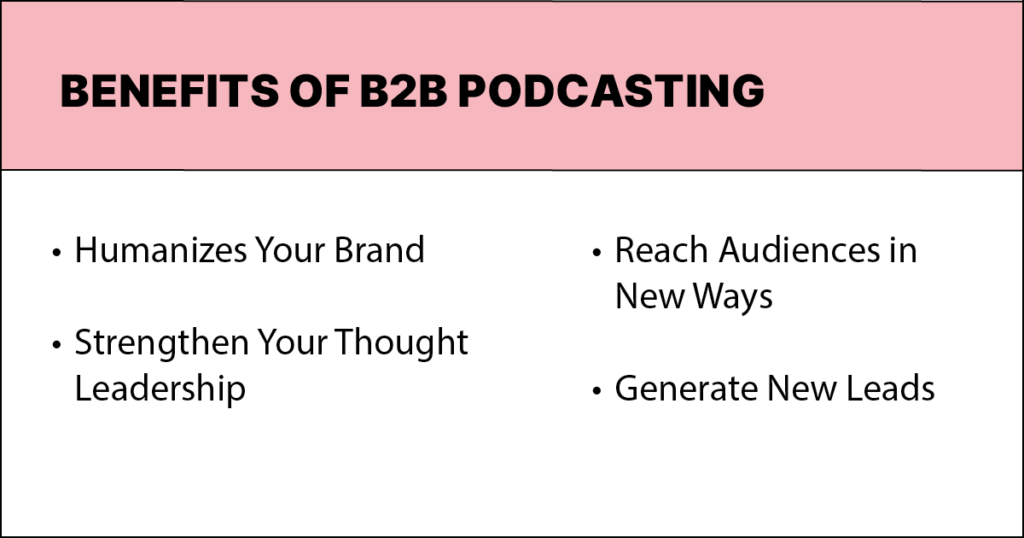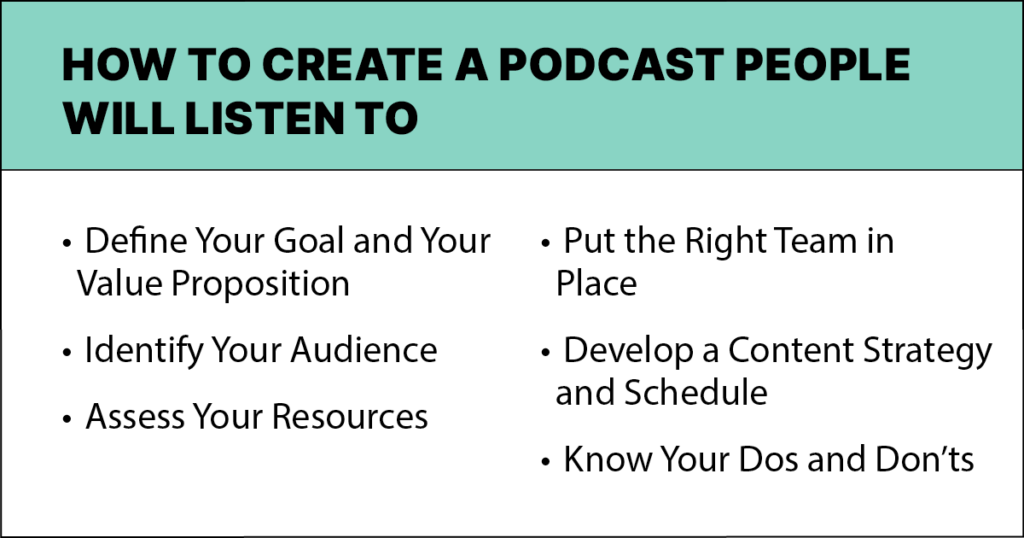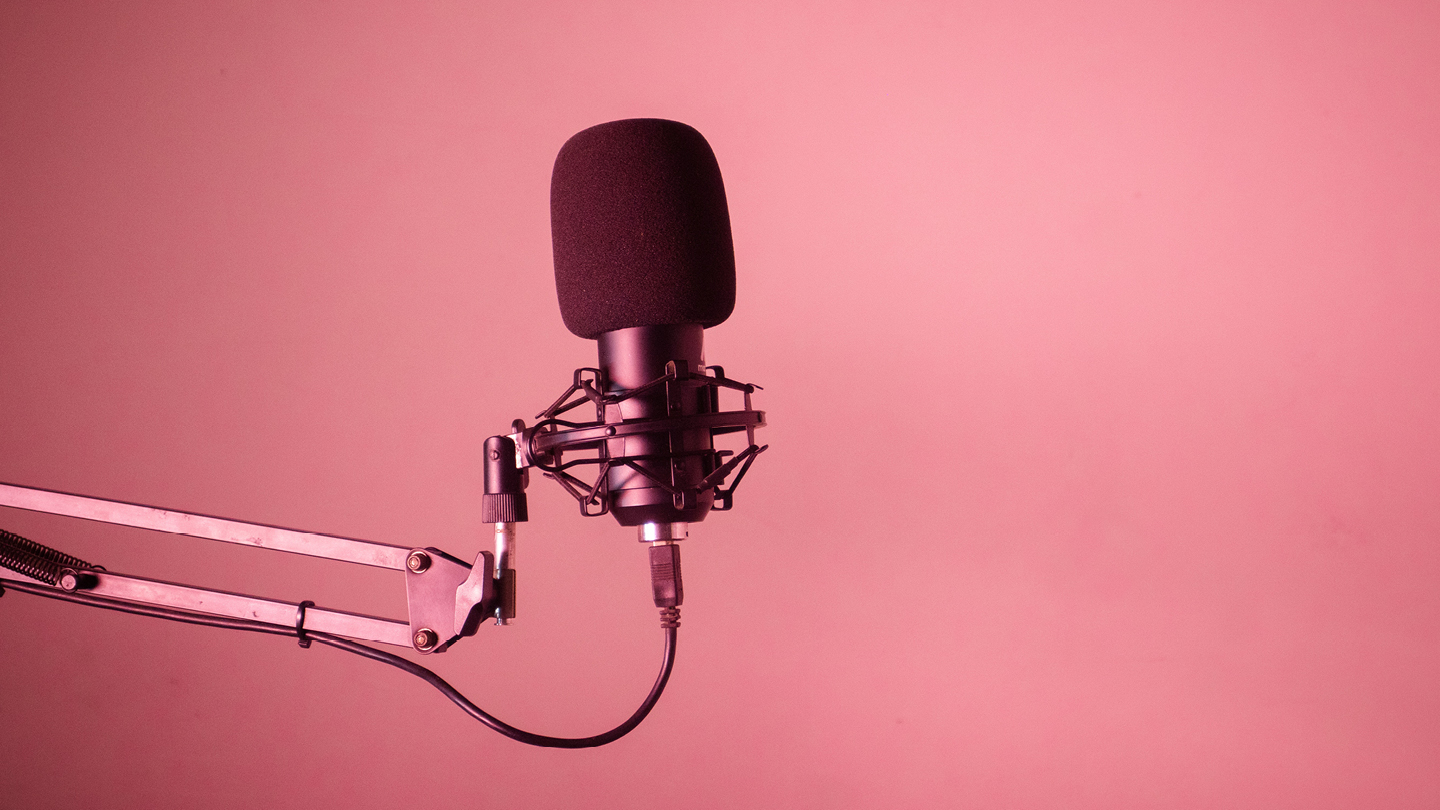Podcasting is an increasingly popular form of content consumption that’s moving beyond niche status. Consumers not only listen to podcasts, they also form deep connections with the shows they enjoy. For brands, B2B podcasting is a powerful opportunity to get closer to your audience with unique, valuable audio content.
Nearly 50% of Americans have listened to a podcast in the past year, according to Pew Research Center. And while many listeners seek out entertainment, business podcasts are the sixth-most popular genre, according to Edison Research.
Learn more about B2B podcasts, why some fail, and how they can elevate your brand and create deeper connections with your audience.
What’s B2B Podcasting?
A B2B podcast is an audio-first program that’s specifically created for individuals and companies in the business-to-business space. These podcasts focus on business topics, often specific to a certain industry, job role or product type.
On a B2B podcast, you’ll typically hear interviews with industry experts, executives and thought leaders discussing an array of topics — business development, marketing, leadership lessons, new technologies and much more.
By starting a podcast, your brand has a new medium for informing, educating and entertaining a business-oriented audience.
Why Some Podcasts Fail
Starting a podcast is a fun and exciting way to share your content, amplify your brand voice and connect with customers and other interested prospects. However, starting a podcast isn’t easy — and sticking with one can be even more difficult
A podcast requires its own strategy, planning and resources. It’s not a quick add-on to your existing content calendar or marketing efforts. Two major reasons podcasts fail is because they lack a strategy and a repeatable production process.
Even if you get your podcast going, you might struggle to gain traction or show ROI to internal stakeholders. Common challenges include:
- Poor recording quality.
- Lack of internal capacity or stakeholder buy-in.
- No budget to support the work.
- Not having a strategy for distribution and promotion.
- Difficulty finding the time to record on a regular schedule and/or find guests.
How B2B Podcasting Can Elevate Your Brand
B2B podcasting offers businesses the opportunity to expand their brand and give their audiences a fresh perspective. Here are a few ways B2B podcasting can benefit your brand and drive results.
Humanize Your Brand
Even the best brand content can be viewed with suspicion by consumers who are wary of being sold to. B2B podcasts can overcome this problem by allowing for free-flowing conversations with recognized experts. You’re inviting the listener to spend time with you — and learn along the way — even as you mention products, services or best practices that align with your brand.
Resist the urge to make a hard sell on your podcast. Tell stories, and let the audience into what life at your brand or in your industry looks like. Help listeners connect with your brand on a human level instead of just as something they purchase.
Strengthen Your Thought Leadership
What better way to get your thoughts and ideas out there than to sit down, record and talk about it with another person?! Through podcasting, you can highlight the subject matter experts in your company and create a platform where they can share their expertise, which can strengthen the thought leadership in your company.
A podcast can also help a business establish themselves as the authority on certain topics or areas of business. For example, if a business specializes in video production, a podcast that focuses on sharing the latest techniques and providing how-to content can help make this company the go-to for any information that professionals or small business owners need.
Reach Audiences in New Ways
Creator Science founder and podcaster Jay Clouse notes that audio podcasts aren’t an ideal way to build an audience in the way channels such as email and YouTube can. “For the majority of creators, audio podcasts don’t attract NEW audiences. Podcasts deepen relationships with your existing audience,” Clouse advises.
That doesn’t diminish the potential for audio podcasts, but it should affect your strategy. Audio podcasts are about thought leadership, not customer acquisition.
If you want to reach people who haven’t seen your brand before, consider pairing video with your podcasts and also publishing them on YouTube, with the full video optimized for the algorithm. From there, you can repurpose the content through short video clips, blog-style show notes and other uses.
This provides an opportunity to reach a much larger audience than traditional marketing methods, as podcasts can be spread quickly and easily.
Generate New Leads
Podcasts don’t necessarily generate leads directly, and certainly not to the extent a successful nurture email campaign or comprehensive SEO strategy can.
But podcasts offer one of the most promising ways for your target audience to spend substantial time with your brand and its ideas. Make sure your podcast episode descriptions offer a way to learn more about your company’s offerings. Show notes should have a clear call to action to relevant materials or contacts — and they can dovetail with your SEO strategy.
While you might not generate the quantity of leads with podcasts that other channels might yield, you’ll likely pull in high-quality, informed and engaged leads who resonate with your content and thought leadership.

How to Create a Podcast People Will Listen to
Anyone can grab a microphone, hit record, and start talking about a subject that matters to them. But how can you make sure that people will actually tune in and listen? A podcast is an investment of your time, your team’s time, and the company’s resources.
Start by asking yourself: “Why am I creating this content? Who cares? How does it align with our other goals? What is the big idea?” Then, dive into these steps.
Define Your Goal and Your Value Proposition
Start to define your goal by asking yourself:
- Are you trying to increase your brand awareness?
- Elevate someone within your organization?
- Increase your network within the industry or with other thought leaders?
- Incorporate a podcast into a larger content marketing strategy?
The answers to those questions can help you decide whether you’re ready for a podcast and how it should be positioned.
Additionally, think about your podcast as a way to further differentiate your brand. If your business wants to be known as the cutting-edge provider, for example, your B2B-branded podcast might focus on interviewing other thought leaders or commenting on major industry news. Your host should probably be an executive who can speak confidently and represent the brand’s views.
A pilot episode for internal audiences is a great way to test your assumptions before making a larger commitment.
Identify Your Audience
Knowing your audience can help you create content that’s catered to their interests and needs. Start by looking at your existing audiences. What are the demographics of your customer base? What about your website traffic and email list?
Beyond that, conduct research into what types of podcasts those people are listening to. If competitors have podcasts, seek to understand how they’ve positioned themselves and what kinds of professionals are listening to them.
By aligning your target audience with your existing customers, prospects and other audiences, you can use all your channels to promote the podcast and expand its reach. For example, you can post a link to new episodes on social media or in your email newsletter. You can publish show notes on your brand blog to create SEO value and give a full preview to readers before they dive into the audio. You can even use paid advertising to promote the podcast to select audiences.
Assess Your Resources
What does your budget look like? Do you have the right tech? Do you have a marketing strategy? The most important part of assessing your resources is making sure that you have the budget to support your podcast. A budget to produce a B2B podcast typically involves:
- The cost of hiring a podcast producer to oversee the recording, editing, and production of the podcast (if there isn’t one on your team).
- The cost of purchasing audio recording equipment such as microphones, digital audio recorders, cables, and stands.
- The cost of recording on podcast-first software (think Riverside, not Zoom) and editing the episodes at a professional level.
- Any costs associated with content around the podcast, including writing show notes and creating promotional assets.
Put the Right Team in Place
Your podcast is only as good as the people creating it. Depending on the type and size of the podcast, roles can include content production, editing, and marketing. Some brands will have this talent in-house, while others will seek out freelancers or a content agency that’s experienced in podcasting.
Develop a Content Strategy and Schedule
To develop a good content strategy for your B2B podcast, start by researching your target audience and their needs. This will help you identify relevant topics. Consider whether you want an overarching content strategy, such as a topic theme spanning multiple episodes.
During the production process, create an outline for each episode with key points, potential questions, what to mention and what to leave out, and guest information. It’s easier to fix the quality of your discussion or audio up front rather than in the editing room. And don’t try to improvise. Make sure everyone is prepared so they can be clear, concise and intentional in their words.
Pick a publishing frequency, whether that’s weekly, monthly or something in between. The exact frequency isn’t necessarily as important as being consistent. You want listeners to get into a habit of looking for your next episode each Monday morning, Friday afternoon or whenever your episodes drop.
Know Your Dos and Don’ts
Podcasts aren’t a one-and-done effort. Keep these basics in mind throughout the process.
Do:
- Plan to promote your episode for up to 6 months.
- Promote across key channels.
- Publish show notes for SEO.
- Plan topics that matter to your ideal listener.
- Record a pilot episode to see whether this is something you’re comfortable doing.
Don’t
- Wing it.
- Record before planning.
- Publish without editing.
- Leave your show in a silo.

3 Successful B2B Podcasts
Here are three top branded podcasts that succeed in keeping their audiences engaged and coming back for more.
Punk Rock HR
This weekly podcast, hosted by HR expert, author and speaker, Laurie Ruettimann is committed to changing the broken world of work — and most recently, the world of corporate drinking. Laurie sits down with guests from all walks of life to have candid, meaningful conversations with leaders, experts and advocates determined to change the face of work and the world.
Redefining Work
Lars Schmidt is exploring the new world of work, one guest at a time. In this weekly podcast, he talks to innovators, big thinkers and doers who are shaping what work will look like moving forward. The show takes a deeper look into all aspects of a business and how we can continue to collaborate to support growth and change.
Inside the Mind
Greg Portell and Katie Thomas are leaders in the retail practice at Kearney, the global management consulting firm. The Inside the Mind podcast takes a look into consumer behaviors by interviewing members from these unique consumer communities to share their stories. These stories are then pieced together into a narrative framework.
Start Your B2B Podcast Today!
Brand podcasts can be a powerful tool, but the effort required to make them successful shouldn’t be understated. Treat podcasts like any other type of content: Know your audience and goals, create a strategy, gather the right resources and commit to long-term investment.
B2B podcasting is a growing niche in the burgeoning world of audio and video podcasts. The opportunity is yours — if you have a plan.






